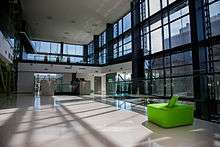Tallinn University of Technology
Established in 1918, Tallinn University of Technology (TalTech; Estonian: Tallinna Tehnikaülikool) is the only technical university in Estonia. TalTech, in the capital city of Tallinn, is a university for engineering, business, public administration and maritime affairs.[1][2] TalTech has colleges in Tartu and Kohtla-Järve. Despite the similar names, Tallinn University and Tallinn University of Technology are separate institutions.



Tallinna Tehnikaülikool | |
| Motto | Mente et manu |
|---|---|
Motto in English | With wisdom and hands |
| Type | Public |
| Established | 1918 |
| Rector | Academic Jaak Aaviksoo |
Academic staff | 985; international 168 |
| Students | 11 000; international 1 500 |
| Location | , 59.3950°N 24.6719°E |
| Affiliations | BALTECH, NORDTEK, UNICA, CESAER, SEFI, EUA, EAIE, NAFSA |
| Website | www |
History
In the early twentieth century, Estonia recognised an urgent need for locally trained engineering specialists. Until then, young people from Estonia had received their specialist education in St. Petersburg, Germany or Riga. Opportunities had to be sought for engineering-minded people to acquire an Estonian-based education which was adapted to local conditions and needs; Estonia was in the process of establishing itself as an independent country.
On 17 September 1918, the Estonian Engineering Society opened an Estonian-based engineering school named Special Engineering Courses. That date has been recognised as the founding date of Tallinn University of Technology.[3] Programmes were offered in mechanical, electrical, civil and hydraulic engineering, shipbuilding and architecture. In 1919, the school became the private Tallinn College of Engineering, which in 1920 was declared a state institution. Teachers' efforts to develop an Estonian terminology for science and technology proved fruitful and the first engineering books were published. In 1923, the first engineering graduation theses were defended in Estonia. In the same year, a state laboratory of materials testing opened for research work.
By the 15 September 1936 Act of the Head of State, the school was granted university status, and named Tallinn Technical Institute. The institute had two faculties: civil and mechanical engineering and chemistry and mining. In 1938, the name Tallinn Technical University (Tallinna Tehnikaülikool, TTÜ in Estonian) was effective. In 1940 the Faculty of Economics, in 1958 the Faculty of Power Engineering and in 1965 the Faculty of Control Engineering were founded. After 2003 the university was known in English as Tallinn University of Technology (TUT).
On 1 July 2008, TTÜ took over International University Audentes (IUA), which became part of the Faculty of Economics and Business Administration, except the Law School which joined the Faculty of Social Sciences. In 2014 an agreement for merger of the Estonian Maritime Academy with TTÜ was signed.
On 16 November 2016, TTÜ and the Estonian Information Technology College signed a merger agreement. Since 1 August 2017, the IT College is a part of TTÜ.[4]
On 17 September 2018, Tallinn University of Technology adopted a new short name TalTech, replacing the previous abbreviations such as TTÜ, TUT and TTU.[5]
TalTech today
There are over 30 fully accredited international degree programmes (4 Bachelor programmes, 18 Master programmes and 10 PhD programmes) that are available fully in English.
TalTech conducts research and develops high-tech applications in many fields:
- Organic and analytic chemistry (Chemistry)
- Food biotechnology and neurobiology (Biotechnology)
- Geology (Earth Sciences)
- Power converter research (Power Electronics)
- Solar cell materials and tribomaterials (Material Sciences)
- Computer system research and biorobotics (ICT)
- Near-zero energy building (Civil Engineering)
- Public administration (Social Sciences)
Rankings
| University rankings | |
|---|---|
| Global – Overall | |
| THE World[6] | 601-800 |
| QS World[7] | 601-650 |
Tallinn University of Technology is the third highest ranking university in the Baltic states, placing in the 601-800 bracket in Times Higher Education World University Rankings 2016-17[8] and in the 601-650 bracket in QS World University rankings[9] (behind Tartu University and Vilnius University). In QS University Rankings for Eastern Europe and Central Asia 2016, TalTech ranked 30th, placing it among the top ten technical universities in the region[10] and confirming its status as the best technical university in the Baltics.
Schools
- School of Engineering: Dean Arvo Oorn
- School of Business and Governance: Dean Prof. Enn Listra
- School of Science: Dean Prof. Tõnis Kanger
- School of Information Technologies: Dean Prof. Gert Jervan
- Estonian Maritime Academy: Director Roomet Leiger
Institutes
- Certification Centre: Director Tanel Tuisk
- Institute of Geology: Director Prof. Michael Hitch
- Institute of Marine Systems: Director Prof. Jüri Elken
- Technomedicum: Director Prof. Kalju Meigas
International degree programmes in English
The internationalization of higher education is one of the key strategic goals of Tallinn University of Technology. The university offers over 30 degree programmes in English: 4 Bachelor programmes,[11] 18 Master programmes[12] and 10 PhD programmes.[13]
Bachelor's level programmes in English:
- Cyber Security Engineering (BSc)
- International Business Administration (BA)
- Law (BA)
- Integrated Engineering (BSc)
Master's level programmes in English:
- Cyber Security (MSc)
- Communicative Electronics (MSc)
- Computer and Systems Engineering (MSc)
- E-Governance Technologies and Services (MSc)
- Health Care Technology (MSc)
- Software Engineering (MSc)
- International Business Administration (MBA)
- International Relations and European-Asian Studies (MA)
- Law (MA)
- Technology Governance (MA)
- Public Sector Innovation and e-Governance (MSc)
- Industrial Engineering and Management (MSc)
- Environmental Engineering and Management (MSc)
- Design and Engineering (MSc) (joint programme with Estonian Academy of Arts)
- Materials and Processes for Sustainable Energetics (MSc) (joint programme with University of Tartu)
- The Technology of Wood and Plastic (MSc)
- Mechatronics (MSc)
- European Architecture (MSc & M.ARCH)
PhD programmes in English:
- Civil and Environmental Engineering
- Chemical and Materials Technology
- Chemistry and Gene Technology
- Earth Sciences
- Economics and Business Administration
- Engineering Physics
- Information and Communication Technology
- Mechanical Engineering
- Power Engineering and Geotechnology
- Public Administration
Alumni
Besides the entire technological elite of Estonia, alumni include numerous industrialists and businessmen, including Hardi Meybaum, the CEO and a co-founder of GrabCAD; Toomas Luman, the Chairman of the Estonian Chamber of Commerce; Tiit Vähi, the former Prime Minister and eminent industrialist, as well as Taavi Kotka, former Chief information officer of Estonian Government and leader of e-residency programme, and Jüri Ratas, prime minister of Estonia. The Vice President and former President of the Estonian Academy of Science, Jüri Engelbrecht, is also a TalTech graduate.
Partner universities
The cooperation, especially with European universities is more focused for curricula development, project cooperation and networking. In Europe, student and staff mobility is mainly organised under Erasmus programme. A selection of university-wide partnerships:[14]

















































References
- "Tallinn University of Technology". [Archimedes Foundation], Study in Estonia. Archived from the original on 2012-05-24.
- Educations.com. "Tallinn University of Technology".
- Tehnikaülikool, Tallinna. "History". www.ttu.ee. Retrieved 2019-02-05.
- "TTÜ and the IT College signed a merger agreement". Tallinn University of Technology. Retrieved 25 November 2016.
- "Tallinn University of Technology to adopt short name TalTech". Tallinn University of Technology. Retrieved 5 February 2019.
- World University Rankings 2017-2018
- "Tallinn University of Technology Profile". Times Higher Education World University Rankings. Retrieved 11 April 2017.
- "Tallinn University of Technology Rankings". QS Top Universities. Retrieved 11 April 2017.
- "Eastern Europe and Central Asia Rankings 2016". QS University Rankings. Retrieved 11 April 2017.
- "Bachelor's studies". Tallinn University of Technology. Retrieved 15 August 2017.
- "Master's studies". Tallinn University of Technology. Retrieved 15 August 2017.
- "PhD Programmes". www.ttu.ee. Retrieved 2017-08-15.
- "TTÜ partner universities". Tallinn University of Technology. Retrieved 16 August 2017.
External links
| Wikimedia Commons has media related to Tallinn University of Technology. |